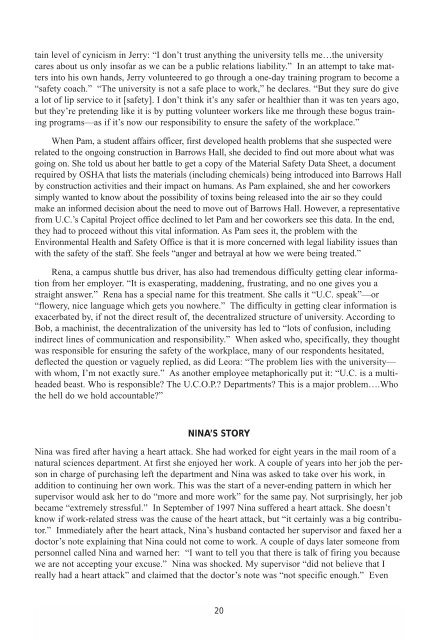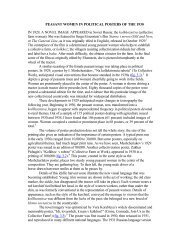Berkeley's Betrayal - Public Sociology @ Berkeley - University of ...
Berkeley's Betrayal - Public Sociology @ Berkeley - University of ...
Berkeley's Betrayal - Public Sociology @ Berkeley - University of ...
You also want an ePaper? Increase the reach of your titles
YUMPU automatically turns print PDFs into web optimized ePapers that Google loves.
tain level <strong>of</strong> cynicism in Jerry: “I don’t trust anything the university tells me…the universitycares about us only ins<strong>of</strong>ar as we can be a public relations liability.” In an attempt to take mattersinto his own hands, Jerry volunteered to go through a one-day training program to become a“safety coach.” “The university is not a safe place to work,” he declares. “But they sure do givea lot <strong>of</strong> lip service to it [safety]. I don’t think it’s any safer or healthier than it was ten years ago,but they’re pretending like it is by putting volunteer workers like me through these bogus trainingprograms—as if it’s now our responsibility to ensure the safety <strong>of</strong> the workplace.”When Pam, a student affairs <strong>of</strong>ficer, first developed health problems that she suspected wererelated to the ongoing construction in Barrows Hall, she decided to find out more about what wasgoing on. She told us about her battle to get a copy <strong>of</strong> the Material Safety Data Sheet, a documentrequired by OSHA that lists the materials (including chemicals) being introduced into Barrows Hallby construction activities and their impact on humans. As Pam explained, she and her coworkerssimply wanted to know about the possibility <strong>of</strong> toxins being released into the air so they couldmake an informed decision about the need to move out <strong>of</strong> Barrows Hall. However, a representativefrom U.C.’s Capital Project <strong>of</strong>fice declined to let Pam and her coworkers see this data. In the end,they had to proceed without this vital information. As Pam sees it, the problem with theEnvironmental Health and Safety Office is that it is more concerned with legal liability issues thanwith the safety <strong>of</strong> the staff. She feels “anger and betrayal at how we were being treated.”Rena, a campus shuttle bus driver, has also had tremendous difficulty getting clear informationfrom her employer. “It is exasperating, maddening, frustrating, and no one gives you astraight answer.” Rena has a special name for this treatment. She calls it “U.C. speak”—or“flowery, nice language which gets you nowhere.” The difficulty in getting clear information isexacerbated by, if not the direct result <strong>of</strong>, the decentralized structure <strong>of</strong> university. According toBob, a machinist, the decentralization <strong>of</strong> the university has led to “lots <strong>of</strong> confusion, includingindirect lines <strong>of</strong> communication and responsibility.” When asked who, specifically, they thoughtwas responsible for ensuring the safety <strong>of</strong> the workplace, many <strong>of</strong> our respondents hesitated,deflected the question or vaguely replied, as did Leora: “The problem lies with the university—with whom, I’m not exactly sure.” As another employee metaphorically put it: “U.C. is a multiheadedbeast. Who is responsible? The U.C.O.P.? Departments? This is a major problem….Whothe hell do we hold accountable?”NINA’S STORYNina was fired after having a heart attack. She had worked for eight years in the mail room <strong>of</strong> anatural sciences department. At first she enjoyed her work. A couple <strong>of</strong> years into her job the personin charge <strong>of</strong> purchasing left the department and Nina was asked to take over his work, inaddition to continuing her own work. This was the start <strong>of</strong> a never-ending pattern in which hersupervisor would ask her to do “more and more work” for the same pay. Not surprisingly, her jobbecame “extremely stressful.” In September <strong>of</strong> 1997 Nina suffered a heart attack. She doesn’tknow if work-related stress was the cause <strong>of</strong> the heart attack, but “it certainly was a big contributor.”Immediately after the heart attack, Nina’s husband contacted her supervisor and faxed her adoctor’s note explaining that Nina could not come to work. A couple <strong>of</strong> days later someone frompersonnel called Nina and warned her: “I want to tell you that there is talk <strong>of</strong> firing you becausewe are not accepting your excuse.” Nina was shocked. My supervisor “did not believe that Ireally had a heart attack” and claimed that the doctor’s note was “not specific enough.” Even20



